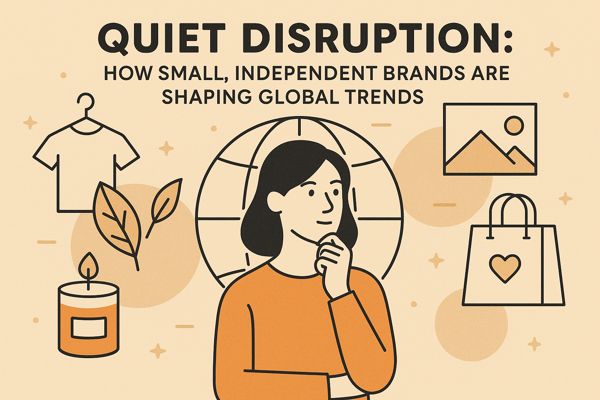Global trends were once set by massive corporations with million-dollar campaigns and prime-time TV spots. But today, a quiet revolution is happening. Small, independent brands — often run by just a few people or even one passionate founder — are influencing what the world wears, eats, buys, and believes in.
This “quiet disruption” doesn’t involve flashy ads or celebrity endorsements. Instead, it’s driven by authenticity, creativity, and direct connection with audiences. Let’s take a closer look at how small brands are changing the game on a global scale.
The Power of Niche
Big companies often try to appeal to everyone. Small brands, on the other hand, thrive by speaking directly to specific communities or values. They’re not afraid to focus on a niche — whether it’s vegan skincare, slow fashion, or handcrafted home goods.
By doing so, they attract loyal followers who feel seen and understood. These customers aren’t just shopping — they’re supporting a mission or identity. In many cases, word-of-mouth from passionate fans spreads faster and farther than any ad campaign could.
Social Media as the Launchpad
Independent brands don’t need massive marketing budgets. With platforms like Instagram, TikTok, and Pinterest, even the smallest business can reach a global audience. Creative content, behind-the-scenes videos, and real stories resonate more than polished commercials.
Many viral trends — from sustainable packaging to minimalist design — started with small creators sharing their ideas online. Today’s consumers want transparency and personality, not perfection. Independent brands deliver that in a way big corporations often can’t.
Values Over Volume
One major shift in consumer behavior is a growing preference for purpose over price. People are asking: Who made this? Is it sustainable? What does this brand stand for?
Independent brands are often built around clear values — such as ethical production, inclusivity, or environmental care. These values don’t just guide product choices — they shape the entire customer experience. As more buyers seek brands that align with their beliefs, small businesses gain a powerful edge.
This shift is especially visible among younger generations, who are more likely to support brands that speak to their social and environmental concerns.
Agility in Action
Small brands are nimble. They don’t need layers of approval or years of planning to try something new. That agility allows them to spot emerging trends and adapt quickly — sometimes setting the trend themselves.
For example, a small jewelry maker can launch a new design based on customer feedback in just days. A micro coffee roaster might adjust its sourcing or packaging after a single social media comment. This responsiveness builds stronger relationships and keeps brands ahead of the curve.
Global Impact, Local Roots
Despite their small size, independent brands often have international reach. Online stores, global shipping, and social platforms allow a handmade product from a tiny town to end up on the other side of the world.
Yet, most of these businesses stay deeply rooted in their local culture. They showcase regional materials, traditions, or design — which adds authenticity and uniqueness. As a result, global customers get something truly original and meaningful, not mass-produced.
This balance — local roots with global reach — is part of what makes small brands so influential today.
Real People, Real Stories
Another reason independent brands are shaping trends is the human connection. Consumers love knowing who’s behind a product. Founders often share their journey, challenges, and passion — which builds trust and loyalty.
In contrast to corporate branding, which can feel cold or distant, small brands invite people into a story. And those stories are powerful. Whether it’s a mother making eco-friendly toys in her kitchen or an artist turning a hobby into a full-time business, real stories stick with people — and they drive purchases.
Quiet Doesn’t Mean Small Impact
The rise of small brands doesn’t always come with noise or spectacle. It’s quiet, steady, and driven by authenticity. But the impact is massive.
Big companies are already paying attention — many are mimicking the branding, packaging, and storytelling styles of smaller brands. Some even acquire independent labels to stay relevant. That’s a sign of just how much influence these disruptors now hold.
Small doesn’t mean weak. In fact, in today’s market, being small can be your biggest strength.
Final Thoughts: The Future Belongs to the Brave
The business world is no longer dominated by giants alone. Thanks to technology, transparency, and changing consumer values, small brands are setting global trends — one thoughtful product at a time.
If you’re a small business owner, take heart: your voice matters. If you’re a consumer, remember that your choices shape the market. Every purchase from an independent brand is a vote for innovation, authenticity, and a better kind of capitalism.
In this age of quiet disruption, even the smallest brand can spark a global shift.



